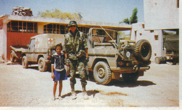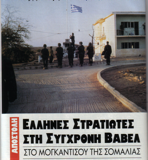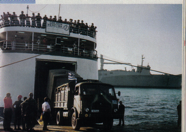(4 March 1993 – 3 March 1994)
The situation in Somalia deteriorated in 1990, when the Somalian Army had been disbanded. The arms depots were pillaged, tribes were equipped with arms and civil war broke out.
With the 751 Resolution, dated April 1992, the UN Security Council (UNSG) decided to establish UNOSOM I (United Nations Operation in Somalia), in order to deal with the situation and prevent the oncoming conflict. The Force consisted of soldiers from Pakistan and Officers from various countries as Observers.
In September 1992, the above UN Force, failing to fulfill set goals, were isolated and cut off in a building complex, trying to sustain their presence in the country, despite the immense security and survival problems.
794/3-12-92 UNSC Resolution authorized another operation to be conducted by UNITAF (Unity Task Force), under the name “Restore Hope”, from December 1992 to May 1993. The Force was under USCENTCOM command and consisted of 45.000 men (28.000 from USA and 17.000 from Saudi Arabia, Australia, Belgium, Botswana, Canada, Egypt, France, Germany, U.K., Greece, India, Kuwait, Morocco, Nigeria, Norway, New Zealand, Pakistan, Sweden, Tunisia, United Arab Emirates and Zimbabwe.
The force tried hard to restore and maintain order and to facilitate food and medicine deliveries to all over the country.
In March 1993, the chieftains of 14 tribes signed an agreement in Addis Ababa, under U.N. auspices. It was agreed that the U.N. would remain in the country until 1995, so that a government would be established and the State to function again.
In May 1993, UNISOM I was succeeded by UNISOM II, in compliance with the 814/26-3-93 UN Resolution.
Despite the signing of the agreement right after taking the control of Somalia from

UNOSOM II (May, 5th 1993), the retired General Farah-Manchamed Aidict, chieftain of the most populous tribe, with control over the Mogadishu area, demanded to undertake total rule and control of the country. As a result, conflicts between tribes and UNISOM II began and many combatants were killed from both sides.
PARTICIPATION OF THE HELLENIC FORCES:
On 29 January 1993, the Governmental Council on Foreign Policy and Defense approved the assignment of an Army Company of 19 Officers, 7 NCOs and 80 soldiers (64 from the Army, 21 from the Navy, 21 from the Air Force). The force was named as the Hellenic Contingent in Somalia. It departed from Greece on the 26th of February 1993 and arrived in the Capital of Mogadishu on the 4th of March 1993. On the 8th of March 1993, the Hellenic contingent was attached to the French Brigade and was stationed at Uazid, 480 km North-West of Mogadishu.
The Mandate of the Hellenic Contingent was to provide medical assistance, ensure security and distribution of food to the local population in Uazid, as well as to provide limited technical support for the reconstruction of the region, while trying to repair and restore the operation of the local hospital. While stationed in Uazid, the Hellenic Contingent developed the following activities.
- Provision of medical care to 2.500 patients, during 75 missions in various villages in the broader area
- Examination of about 550 patients at the field surgery of the Unit
- 60 successful missions of food distribution in cooperation with the Humanitarian Organization “CONCERN”
- Assignment of medical staff to the medical centre at Uazid, under the supervision of the Hellenic team of the “Doctors of the World” Organization.
- Repair and construction of roads, squares, sports fields, playgrounds, power networks, orphanage homes etc.
Even though that there have been a number of conflicts between U.N. Forces and Aidit-led forces, the Greek Unit did not get involved. However, it suffered one casualty in a rebel ambush on the 14th of October 1993, where Sergeant Soubouros Michail was killed, while escorting civilian vehicles of the “CONCERN” Humanitarian Organization.
The Greek Force, in cooperation with six (6) doctors of “Doctors of the World” Organization, reopened the abandoned hospital at Vazit. By this action, the Force gained in popularity with local population. Four Greek doctors from the “Doctors of the World” Organization developed remarkable activities and assisted many people. Local population, as well as other Services of the E.U. UNICEF and the U.N., appreciated those activities greatly. The Greek doctors were repatriated on the 11th of March 1994, after Gliptis Georgios, Head of the Orphanage home at Uazit was killed, during an armed conflict.
The Hellenic Contingent in Somalia was repatriated on the 3rd of March 1994 after having concluded its mission.


